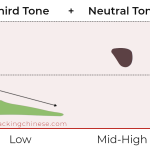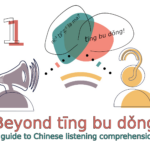Articles in the ‘Beginner’ category Page 11
-
Learning the neutral tone in Mandarin
The neutral tone in Mandarin Chinese can be tricky to learn. How is it pronounced? Is it a fifth tone? And how do you know when it should be used?
Read → -
Beyond tīng bu dǒng, part 2: From sound to meaning in Mandarin
Listening comprehension in Mandarin is complex, and the more I learn about it, the more amazing it seems that we’re able to understand anything at all.
Read → -
Beyond tīng bu dǒng, part 1: A guide to Chinese listening comprehension
Listening comprehension is essential when learning Chinese, but if we want to improve, we need to move beyond tīng bu dǒng and identify what the problem really is.
Read → -
Kickstart your learning with the Skritter Character Course
What’s the best way to learn Chinese characters as a beginner? The Skritter character course is my best attempt at answering that question.
Read → -
Take responsibility for your Chinese learning now
You should be responsible for your own learning, and if you outsource that to someone else, the results might be disastrous. This might sound obvious, but I think the problem is widely overlooked, especially by students enrolled in language courses.
Read → -
Hacking Chinese Podcast two-year anniversary Q&A
This is a Q&A to mark the second anniversary of the Hacking Chinese Podcast! How do you stop translating in your head? Is it worthwhile to study a Pinyin chart? And how do you learn traditional characters after learning simplified?
Read → -
How to learn Chinese characters as a beginner
Whole books have been written about how the Chinese writing system works, and understanding how Chinese characters really work is a lifelong project, but what do you do as a beginner when asked to memorise a list of characters and words? Here are eight easy-to-follow strategies!
Read → -
7 ways to write Mandarin tones
There are many ways of writing down the tones of Mandarin beyond the standard tone marks. Which are they and what pros and cons do they have for learners?
Read → -
Chinese language question triage: When to ask whom about what
When learning Chinese, questions about the language pop up all the time, but what’s the best way to answer them?
Read → -
How to become fluent in Chinese
Being fluent in Chinese is more about being good at applying what you know, rather than knowing everything. Many students focus too much on learning new things, and neglect mastering what they’ve already learnt.
Read →









